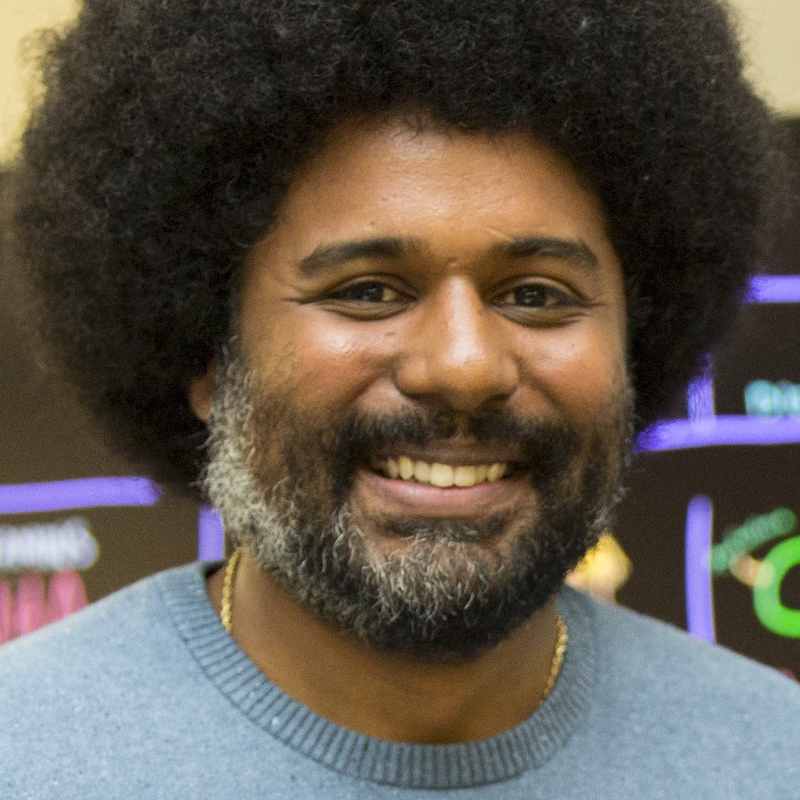Former high school teacher helps spur innovation, equity in K-12 education

Justice Toshiba Walker
2019
Before Penn GSE: High school biology teacher
After Penn GSE: Assistant Professor, The University of Texas at El Paso
"Penn taught me, Penn GSE especially, that if you have the right combination of ingredients—commitment from the structure, mentors, and colleagues—then risk-taking, innovation, and progress will for sure ignite."
"As a high school science teacher, I'd grown professionally over my career and felt I'd reached a ceiling. It was as if the field had stopped innovating, and that began to reflect in my own practice. As I explored pursuing a doctorate, I knew I wanted to be at a place where change was occurring and at great measure. I cared a lot about serving underrepresented groups in diverse contexts—and training in a place where there were people who would challenge me to think unconventionally and at the edge of thought when it came to shaping the future of science education. That led me to Penn GSE's Teaching, Learning, and Teacher Education program.
Around the time I joined Penn GSE, my advisor, Yasmin Kafai, had secured funding from the National Science Foundation to pursue the development and use of an open-source educational instrument for biofabrication in pre-college settings. I consider myself a biologist first, and Yasmin's background in computer sciences helped me reimagine how such a tool, today known as the biomakerlab, could help learners understand pie-in-the-sky ideas about genetics and biodesign, but also actualize those possibilities in real life. I knew this was a paradigmatically different way of doing life science: a shift from primarily inquiry-driven practice to one that emphasizes design and material construction in the ways we observe today in computing. Yasmin fostered my interest in this area and provided space to gain experience as a collaborative partner in these projects, where disciplines intersect, and social constructions are blurred.
I had a lot of self-doubts when I started my program, and I was nervous about the level of writing I would have to maintain to keep up with the field. I expressed that early on and was candid about it. The Dean, one of the former Associate Deans, and my advisor met my concerns with a strong commitment to my professional growth, scholarship, and success. This made a big difference for me; I could take risks and go out on a limb when charting out areas of life science where there are few education paradigms to account for what's happening in the field. Trying to describe the world and education in new terms so we can uplift and include more of those traditionally underrepresented or marginalized groups in the burgeoning tech field is so important when it comes to innovation and creativity. Penn taught me, Penn GSE especially, that if you have the right ingredients—commitment from the structure, mentors, and colleagues—then risk-taking, innovation, and progress will surely ignite.
In my new role as an assistant professor, I study perspectives, practices, and places. This is to say, I investigate how people or learners respond to learning interventions, and I write about how we might update what we consider science to include modern and more culturally relevant practice. I do this mostly in life science using DIYbio, biomaking, and biodesign, all of which are iterations of synthetic biology. It's a wild west of sorts, where not many people are doing it, so I get to play around with ideas and have fun in my work because there's no one to tell me what to do or how to do it.
As I'm sharing this, I’m in my third year as an assistant professor at the University of Texas El Paso (UTEP). The academic job market presents its own challenges. Thankfully, the training I received at Penn prepared me to be able to pivot and respond to quick changes in the process, and the insights I got from my advisor and colleagues helped me negotiate the terms of my appointment; I received a temporary appointment in the College of Science, which makes it easier to collaborate across the university and connect with students. This was instantiated recently with two NSF-funded grants I secured (one of which I lead) in collaboration with faculty in computer science.
Institutionally, UTEP is working to enhance infrastructure to support STEM Education Research—reflected in my role as PI in various projects and my affiliation with the recently established and endowed Hopper-Dean Foundation Center for Excellence in K-12 Computer Science Education. This center focuses on research and practice initiatives that spur innovation and equity in K-12 education. I also established the ABC Learning Lab where I work with a growing team of funded student research assistants to investigate emerging technologies involving advanced bio and computing technologies for teaching and learning. I attribute my ability to hit the ground running as a scholar to my training at Penn. When I reached El Paso, I knew the connections I needed to make through departments and spaces to be successful, and that's what I'm doing with relationships I’ve been working to develop with Fal Lab El Paso and, as a board member, Insights El Paso Science Center.
Penn catalyzes innovation in ways that are only sometimes possible because of structures, resources, or resistance. That's what I remember the most from my time at Penn GSE. I certainly didn’t begin as an expert in the learning sciences, but Penn gives you a space to safely grow and experience that growth, along with the tensions that emerge when that's happening."
